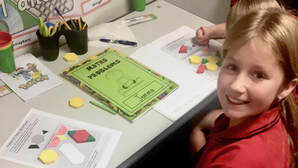Maths

At Ardtornish we use research based methodologies to teach mathematics and our approach is informed by both the "Natural Maths" methodology promoted by Ann Baker and 'Explicit Direct Instruction' principles.
The Natural Maths approach is problem based. Students are challenged to think numerically and to apply their mathematical understandings to real life problems As they work to solve the problem the teacher observes what skills and knowledge they bring to the task and then determines what strategies they may need to be explicitly taught to be successful.
The Natural Maths approach is problem based. Students are challenged to think numerically and to apply their mathematical understandings to real life problems As they work to solve the problem the teacher observes what skills and knowledge they bring to the task and then determines what strategies they may need to be explicitly taught to be successful.
Lessons have a three phase structure.
Each lesson commences with a series of 'Mental Routines.' These routines provide students with an opportunity to revise mathematical language, by both answering questions of varying difficulty and also posing questions for others.
Next students are presented with mathematical problems that are designed to engage them in solving real life problems.
For example:
"Sport Day is fast approaching. There are 326 students in the school and we need to buy participation ribbons for everyone. They come in packs of 25. How many packs will we need to buy?" The first 5 packs cost $13.50 each but after that we are given a discount and are only charged $12.75. How much will we have to spend?
Lessons finish with 'reflection time' in which students share their thinking and discuss the approaches they used to solve the problem posed. During this time, students who accomplished the task share their success strategies with the class, but just as importantly, students who were unsuccessful also contribute to everyone's learning by openly sharing the difficulties they faced and inviting their peers to give them support and feedback. This shared, collaborative approach to learning reinforces the fact that we can all contribute to each other's learning and "Learn through Failure." Reflection time builds students, resilience and reinforces the importance of having a "Growth Mind Set".
The reflection process allows everyone to realise that there are a variety of ways a problem can be approached and being open to exploring your thinking is a powerful way to improve.
This video will give you a greater insight into the Natural Maths approach.
Each lesson commences with a series of 'Mental Routines.' These routines provide students with an opportunity to revise mathematical language, by both answering questions of varying difficulty and also posing questions for others.
Next students are presented with mathematical problems that are designed to engage them in solving real life problems.
For example:
"Sport Day is fast approaching. There are 326 students in the school and we need to buy participation ribbons for everyone. They come in packs of 25. How many packs will we need to buy?" The first 5 packs cost $13.50 each but after that we are given a discount and are only charged $12.75. How much will we have to spend?
Lessons finish with 'reflection time' in which students share their thinking and discuss the approaches they used to solve the problem posed. During this time, students who accomplished the task share their success strategies with the class, but just as importantly, students who were unsuccessful also contribute to everyone's learning by openly sharing the difficulties they faced and inviting their peers to give them support and feedback. This shared, collaborative approach to learning reinforces the fact that we can all contribute to each other's learning and "Learn through Failure." Reflection time builds students, resilience and reinforces the importance of having a "Growth Mind Set".
The reflection process allows everyone to realise that there are a variety of ways a problem can be approached and being open to exploring your thinking is a powerful way to improve.
This video will give you a greater insight into the Natural Maths approach.

